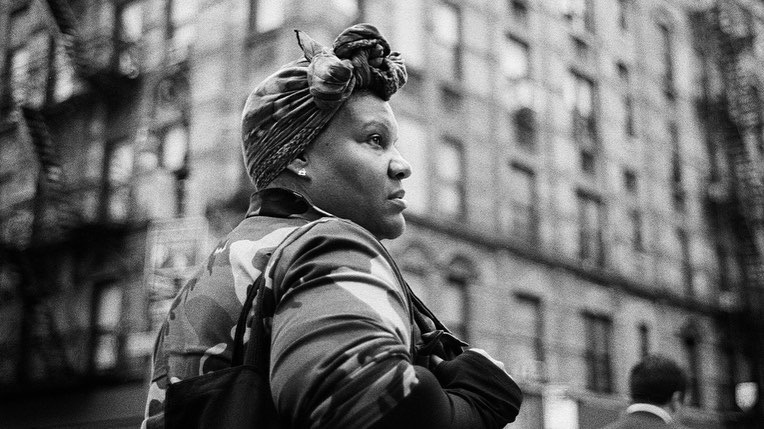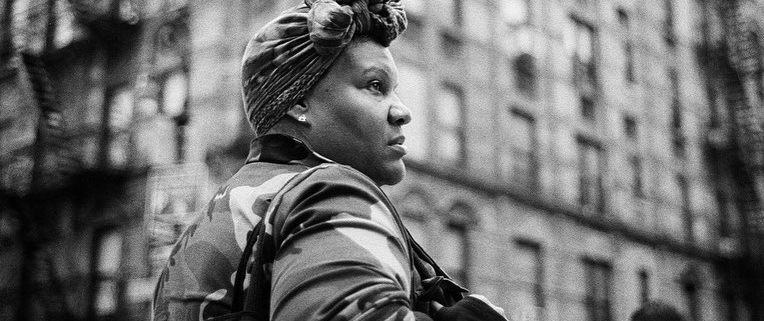‘The Forty-Year-Old Version’ is a playwright’s hilarious and moving reinvention as a rapper

On the brink of reaching the big 4-0, washed-up playwright Radha Blank desperately plans to stage her play in a midlife crisis. Despite winning the theatre’s “30 under 30” award years ago, she lives in a shoebox apartment in Harlem and works as a high school teacher — not the life she dreamed of. However, when her creative frustrations lead to cathartic rapping, she starts to find her own voice again. In full control of her art, writer-director Radha Blank crafts a 40-year-old Black woman’s mixtape in the star-making debut, “The Forty-Year-Old Version.”
From the very first frame, Blank’s vision is clear in the film’s eccentric dialogue, understated performances and killer rhymes. Loosely based on Blank’s own personal struggles as an artist, there is no differentiation between the film’s creator and protagonist. Writer-director Blank simply plays Radha Blank, the “character.” Thus, the film feels less like a fiction and more like a snippet from Blank’s real life. This authenticity is perfectly complemented by the screenplay, which never tries to oversell any character, situation or dialogue. It simply tells the story as it is. This realism creates moments with both absurd humor as well as quiet emotions.
Cinematographer Eric Branco experimented with film stock and color in the film’s stark presentation of Harlem. Other than a few shots of the play, the entire film is presented in a rich, grainy black-and-white palette. The desaturation really frames the artist’s struggling life well. Branco challenges audiences by angling his lens in tight spaces, creating some visually interesting shots. This framing forces viewers to intimately see these characters in private moments. In its rough visuals, the film also effectively introduces Harlem’s underground rap culture. There’s an extremely well-shot scene in particular, where Blank visits a crowded hip-hop battle in a harshly lit club. The celluloid texture and hard lighting adds a vintage quality to the frenetic rapping.
More relevant than anything else, Blank’s depiction of the creative industry is a much-needed perspective in today’s film and theatre scene. As the protagonist struggles to get her play funded, she has to slowly let go of her artistic integrity to the executive producers. The film critiques the liberal white gaze that scrutinizes Black stories and issues. At first, Blank simply wants to tell a story of a young Black couple grappling with the gentrification within Harlem, reflecting the realistic Black experience. However, her producers push her to include ethnic stereotypes, white savior tropes and “poverty porn” to help make her message “universal.” This relevant subtext painfully makes clear of the industry’s need for more Black creators.
Blank leads the film’s mostly unknown cast with tremendous confidence. In a breath of fresh air, the film showcases a plethora of diverse talent on screen with multiple ethnicities, sexualities and religions. In particular, Peter Kim gives an excellent performance as Archie, Blank’s quirky best friend and professional agent. He delivers some of the film’s funniest lines as well as the most heartfelt ones with complete ease. Although, some other supporting characters could have used more development — such as Blank’s rap producer and love interest, D, played by Oswin Benjamin.
In an industry inundated with white male auteurs, ‘The Forty-Year-Old Version’ seems like a necessary dose of change. In depicting the struggling artist’s journey, the film manages to shine a spotlight on its own director. Even with the lo-fi production quality, Blank cements herself as a talent to look out for in the future. In a particularly hard year, this film tells a nuanced story which speaks to anyone seeking to reclaim their voice following tragic circumstances.

